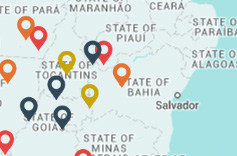Acauã Maroon Community Association (AMQA)
The cunhã(1) tradition: reclaiming the quilombo territory
Rio Grande do Norte
The association seeks to restore the dignity of the residents of the Quilombo(2) Community of Acauã by regaining their ethnic territory and, further, achieving sustainable development, which would bring forth wealth and quality of life for its population. Two hundred and twenty-four people live in the community, with 118 distributed amid 56 family units.
Among the activities carried out by AMQA is the voluntary legal assistance provided by Falcão Popular Legal Aid. It monitors and intervenes, in order to defend the rights and interests of the association, in three cases involving direct and indirect titling of the Territory of the Quilombo Community of Acauã, provided for in Article 68 of the Act of Transitory Constitutional Provisions of the 1988 Brazilian Federal Constitution. Additionally, in partnership with the NGO Acauã, the association participates in the Quilombo Community Radio “Watermelon Educator FM”, the Sewing Studio “Nega Tula” and the Theatre of the Oppressed.
Project
With the project, the organization intends to support the training of leaders and ensure legal assistance in cases regarding titling of the Territory of the Quilombo Community of Acauã.
The project includes combating institutional racism practiced by the National Institute of Colonization and Land Reform of Rio Grande do Norte – INCRA/RN. INCRA/RN is responsible for the demarcation and titling of the quilombo, which began in 2004. AMQA seeks to monitor and pressurize the State actions so that the cases reach their ultimate goals, benefiting and protecting the rights and interests of Quilombo Communities of Acauã.
History
As reported by the proponent, in 1959, the building of the Engenheiro José Batista do Rego Pereira dam, also known as White Well weir [açude Poço Branco], began. Its works coincided with the political emancipation of the city of Poço Branco. With the dam, the level of the river Ceará Mirim increased significantly, leading to the withdrawal of people who lived along its banks. Communities such as Contador and the former community of Acauã had to withdraw from the places where they lived and grew their plantations. After negotiations with the State and the directors of the works for the dam, families of Acauã obtained an area of land where they still live today (about 4 hectares).
Acauã has been fighting to get its land back since 2004, when an administrative proceeding was initiated before INCRA/RN with the scope of titling the quilombo community’s land on behalf of AMQA. In 2005, AMQA reported INCRA/RN to the Attorney’s Office in the State of Rio Grande do Norte alleging institutional racism by delays in land titling. In July 2008, the owner of the farm Maringá (to be expropriated) filed a lawsuit aiming the annulment of the administrative proceeding before INCRA/RN, which deals with the regularization of the quilombo community’s land of Acauã.
(1) “Cunhã” is an ornamental and medicinal plant.
(2) Quilombos are centuries-old communities set up by former slaves in Brazil. “The contemporary concept of the remaining communities of quilombos encompasses the prevalence of an autonomous process of production within the communities, based on specific territorialities socially established as a result of acts of resistance.” (ALMEIDA, Alfredo Wagner. ‘Os quilobolas e a Base de Lançamentos de Foguetes de Alcântara’. Ministry of Environment, Brasília, 2006).
Funding Line
Annual Call for Proposals
Year
-
Total Granted
-
Duration
-
Main Themes
Rights of Maroon and Traditional Populations






